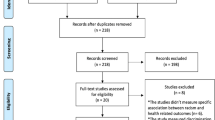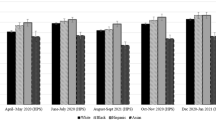Abstract
We examined racial/ethnic differences in cognitive disability and the contribution of sociodemographic factors to these differences. Using logistic regression, we measured the association between race/ethnicity and cognitive disability after adjustment for sociodemographic covariates, including agegroup, sex, education, nativity, region, marital status, and occupation among 2009 American Community Survey respondents (≥25 years). Effect modification was also explored. Cognitive disability was self-reported by 6 % of respondents. The proportion with cognitive disability was highest for Blacks and Native American/Pacific Islanders. Statistically significant effect modification was observed for all sociodemographic covariates, except sex. Although most sociodemographic modifiers revealed a more convoluted relationship between race/ethnicity and cognitive disability, the cognitive benefits of higher education, foreign born nativity, and top-tier occupations were observed among most racial/ethnic groups. The observed interplay between sociodemographics and race/ethnicity highlight a complex relationship between race/ethnicity and cognitive disability. Future research should examine mechanisms for this induced complexity.



Similar content being viewed by others
References
Plassman BL, Langa KM, Fisher GG, Heeringa SG, Weir DR, Ofstedal MB, et al. Prevalence of cognitive impairment without dementia in the United States. Ann Intern Med. 2008;148(6):427–34.
Plassman BL, Langa KM, Fisher GG, Heeringa SG, Weir DR, Ofstedal MB, et al. Prevalence of dementia in the United States: the aging, demographics, and memory study. Neuroepidemiology. 2007;29:125–32.
Moritz DJ, Kasl SV, Berkman LF. Cognitive functioning and the incidence of limitations in activities of daily living in an elderly community sample. Am J Epidemiol. 1995;141:41–9.
Alosco ML, Spitznagel MB, van Dulmen M, Raz N, Cohen R, Sweet LH, et al. Cognitive function and treatment adherence in older adults with heart failure. Psychosom Med. 2012;74(9):965–73.
Hinkin CH, Hardy DJ, Mason KI, Castellon SA, Durvasula RS, Lam MN, et al. Medication adherence in HIV-infected adults: effect of patient age, cognitive status, and substance abuse. AIDS. 2004;18(Suppl 1):S19–25.
Wolf MS, Curtis LM, Wilson EAH, Revelle W, Waite KR, Smith SG, et al. Literacy, cognitive function, and health: results of the LitCog Study. J Gen Intern Med. 2012;27(10):1300–7.
Insel K, Morrow D, Brewer B, Figueredo A. Executive function, working memory, and medication adherence among older adults. J Gerontol B Psychol Sci Soc Sci. 2006;61(2):P102–7.
Stilley CS, Sereika S, Muldoon MF, Ryan CM, Dunbar-Jacob J. Psychological and cognitive function: predictors of adherence with cholesterol lowering treatment. Ann Behav Med. 2004;27(2):117–24.
Shipley BA, Der G, Taylor MD, Deary IJ. Cognition and all-cause mortality across the entire adult age range: health and lifestyle survey. Psychosom Med. 2006;68:17–24.
Zhu CW, Sano M, Ferris SH, Whitehouse PJ, Patterson MB, Aisen PS. Health-related resource use and costs in elderly adults with and without mild cognitive impairment. J Am Geratr Soc. 2013;61(3):396–402.
Ardila A, Ostrosky-Solis F, Rosselli M, Gómez C. Age-related cognitive decline during normal aging: the complex effect of education. Arch Clin Neuropsychol. 2000;15(6):495–513.
Dartigues J, Gagnon M, Letenneur L, Barberger-Gateau P, Commenges D, Evaldre M, et al. Principal lifetime occupation and cognitive impairment in a French elderly cohort (Paquid). Am J Epidemiol. 1992;135(9):981–8.
Le Carret N, Lafont S, Letenneur L, Dartigues J, Mayo W, Fabrigoule C. The effect of education on cognitive performances and its implication for the constitution of the cognitive reserve. Dev Neuropsychol. 2003;23(3):317–37.
Hultsch DF, Hertzog C, Small BJ, Dixon RA. Use it or lose it: engaged lifestyle as a buffer of cognitive decline in aging? Psychol Aging. 1999;24(2):245–63.
Håkanson K, Rovio S, Helkala E, Vilska A, Winblad B, Soininen H, et al. Association between mid-life marital status and cognitive function in later life: population based cohort study. BMJ. 2009;339:1–8.
Leveille SG, Guralnik JM, Ferrucci L, Corti MC, Kasper J, Fried LP. Black/White differences in the relationship between MMSE scores and disability: the Women’s Health and Aging Study. J Gerontol. 1998;53B:P201–8.
Zsembik BA, Peek MK. Race differences in cognitive functioning among older adults. J Gerontol. 2001;56B(5):S266–74.
Sachs-Ericsson N, Blazer DG. Racial differences in cognitive decline in a sample of community-dwelling older adults: the mediating role of education and literacy. Am J Geriatr Psychiatry. 2005;13(11):968–75.
Cummings SM, Neff JA, Husaini BA. Functional impairment as a predictor of depressive symptomatology: the role of race, religiosity, and social support. Health Soc Work. 2003;28:23–32.
Fitzpatrick A, Kuller L, Ives D, Lopez OL, Jagust W, Breitner JCS, et al. Incidence and prevalence of dementia in the Cardiovascular Health Study. J Am Geriatr Soc. 2004;52:195–204.
Miles T. Dementia, race, and education: a cautionary note for clinicians and researchers. J Am Geratr Soc. 2001;49:490.
Acevedo-Garcia D, Bates LM. Latino health paradoxes: empirical evidence, explanations, future research, and implications. In: Rodriguez H, Saenz R, Menjivar C, editors. Latino/as in the United States: changing the face of America. New York: Springer; 2007.
Griffith DM, Johnson JL, Zhang R, Neighbors HW. Ethnicity, nativity, and the health of American Blacks. J Health Care Poor Underserved. 2011;22:142–56.
Abraido-Lanza AF, Dohrenwend BP, Ng-Mak DS, Blake Turner J. The Latino mortality paradox: a test of the “salmon bias” and healthy migrant hypotheses. AJPH. 1999;89:1543–8.
Farley T, Galves A, Dickinson LM, de Jesus Diaz Perez M. Stress, coping, and health: a comparison of Mexican immigrants, Mexican-Americans, and non-Hispanic Whites. J Immigr Health. 2005;7(3):213–20.
Franzini L, Ribble JC, Keddie AM. Understanding the Hispanic paradox. Ethn Dis. 2001;11(3):496–518.
U.S. Census Bureau. Design and Methodology American Community Survey. Washington, DC: U.S. Government Printing Office; 2009.
Erickson W. A guide to disability statistics from the American Community Survey (2008 Forward). Ithaca, NY: Cornell University; 2012. http://digitalcommons.ilr.cornell.edu/edicollect/1290.
US Bureau of Labor Statistics. 2010 Standard Occupational Classification (SOC) user guide. 2010. www.bls.gov/soc/soc_2010_user_guide.pdf.
Rao JNK, Scott AJ. On simple adjustments to Chi square tests with sample survey data. Ann Stat. 1987;15(1):385–97.
SAS Institute Inc. SAS/STAT user’s guide. Cary: SAS Institute; 2008.
Deary IJ, Corley J, Gow AJ, Harris SE, Houlihan LM, Marioni RE, et al. Age-associated cognitive decline. Br Med Bull. 2009;92(1):135–52.
Glymour MM, Avendano M, Berkman LF. Is the ‘Stroke Belt’ worn from childhood? Stroke. 2007;38:2415–21.
Helmer C, Damon D, Letenneur L, Fabrigoule C, Barberger-Gateau P, Lafont S, et al. Marital status and risk of Alzheimer’s disease: a French population-based cohort study. Neurology. 1999;53(9):1953–8.
Adelmann PK, Chadwick K. Marital quality of Black and White adults over the life course. J Soc Pers Relationsh. 1996;13(3):361–84.
Lincoln KD, Chae DH. Stress, marital satisfaction, and psychological distress among African Americans. J Fam Issues. 2010;31(B):1081–105.
Stern Y, Albert S, Tang M, Tsai W. Rate of memory decline in AD is related to education and occupation: cognitive reserve? Neurology. 1999;19:1942–7.
Clair JA, Humberd BK, Caruso HM, Morgan Roberts L. Marginal memberships: psychological effects of identity ambiguity on professionals who are demographically different from the majority. Organ Psychol. 2012;2:71–93.
Bruce JM, Bhalla R, Westervelt HJ, Davis J, Williams V, Tremont G. Neuropsychological correlates of self-reported depression and self-reported cognition among patients with mild cognitive impairment. J Geriatr Psychiatry Neurol. 2008;21(1):34–40.
Acknowledgments
We would like to thank Dr. Mary Sano for her thoughtful insight and extremely useful constructive criticism. The authors would also like to acknowledge the NIH Loan Repayment Program for Health Disparities Research.
Conflict of interest
The authors have no competing interests to disclose.
Author information
Authors and Affiliations
Corresponding author
Rights and permissions
About this article
Cite this article
Benn, E.K.T., Fox, A., Fei, K. et al. Moving Towards a More Comprehensive Investigation of Racial/Ethnic Differences in Cognitive Disability Among US Adults. J Immigrant Minority Health 17, 1105–1113 (2015). https://doi.org/10.1007/s10903-014-0073-0
Published:
Issue Date:
DOI: https://doi.org/10.1007/s10903-014-0073-0




